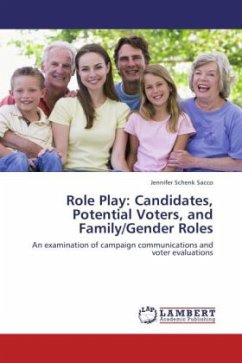
Role Play: Candidates, Potential Voters, and Family/Gender Roles
An examination of campaign communications and voter evaluations
Versandkostenfrei!
Versandfertig in 6-10 Tagen
52,99 €
inkl. MwSt.

PAYBACK Punkte
26 °P sammeln!
This book is an examination of the ways in which male and female candidates for the U.S. House of Representatives, Senate, and Governor invoke their gender and family role information on their campaign websites and in their printed campaign literature, and of the ways voters evaluate a male and a female candidate portrayed in typical fashion in relation to their family of origin and their family of procreation. The candidate data are collected from the website and printed campaign literature of candidates for office in 2002 in each race in which a woman ran on a major party ticket. The experim...
This book is an examination of the ways in which male and female candidates for the U.S. House of Representatives, Senate, and Governor invoke their gender and family role information on their campaign websites and in their printed campaign literature, and of the ways voters evaluate a male and a female candidate portrayed in typical fashion in relation to their family of origin and their family of procreation. The candidate data are collected from the website and printed campaign literature of candidates for office in 2002 in each race in which a woman ran on a major party ticket. The experimental data are collected from experiments conducted with nationally representative samples of the U.S. public. The evidence suggests that traditional gender role expectations affect the ways male and female candidates describe themselves in relation to their families, and that candidates portray themselves strategically in different media and with different audiences. Evidence that voters base their evaluations of candidates on traditional gender role expectations when candidates discuss their families is also presented.












